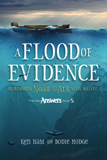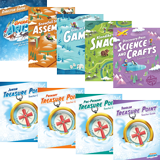Slip and Grip
Day Two Experiment: Studying the Ability of Salt to "Transform" Ice and Water
on October 2, 2017Materials

Experiment 1
Note: This is more involved and is recommended for older kids. Leader can demonstrate for younger kids. Gather one of each of the following per child.
- Glass of very cold water (keep the water cold throughout the day by pouring it from a pitcher of ice water or a thermos)
- Ice cube (cube shape not half-moon shape)
- 5-inch piece of string
- Salt (individual packets work well)
Experiment 2
Note: This is simpler and is recommended for younger children. Gather one of each of the following per child.
- Ice cube (cube shape not half-moon shape)
- Small container to hold the cube
- Pinch of salt
- Magnifying glass or hand lens
- Eyedropper
Class Time Directions
Today, we've been talking about the incredible impact the Bible has had on science, inventions, books, art, music, history, and people's lives. God has created other things in His world that have incredible impact, too. One of those is salt. Where can we find salt in nature?
Salt is found in the water of oceans and seas. The world's oceans are a never-ending source of salt. Do you know why that's true?
Salts are found in rocks and in the soil. As water flows from the mountains to the seas, salt gets carried into the sea and gets stuck there. Over time, more and more salt gets stuck in the ocean.
We also find large deposits of salt trapped between rocks underground. We mine that salt to use for all kinds of things. We can also find salt in soils where lakes have filled and evaporated many times over the years, leaving the salt behind. Animals will actually look for areas where salt is at the surface and lick it. This is called a “salt lick.”
Experiment 1
Before we talk any further, let's take an ice challenge. Put the ice cube in the glass of water. See if you can use the string to remove the ice cube from the glass of water. You must do it without getting your hands wet or letting it touch the side of the glass. Now we're going to see the incredible impact of salt. Dip one end of the string in the water to wet it. Lay that end on the ice cube. Hang the other end over the edge of the glass. Sprinkle salt on the ice cube. We'll now let the glass stand for about 2 minutes.
While we wait, let's talk a little more about salt.
God has created animals and humans to need a certain amount of salt to live. It helps our nerves and muscles work correctly. Let's do 10 quick jumping jacks to remind us that salt is helping those nerves and muscles work.
Salt also helps keep a balance of water in our bodies. It has even been used like medicine to treat sore throats or sinus infections.
Salt is also one of the basic human tastes. Who likes salty foods? Tell your neighbor some salty foods you can think of and what your favorite salty food is. Salt is one of the main seasonings used around the world throughout history. It also has been used for thousands of years to preserve meat.
Here are some interesting facts about the impact of salt in history.
- Many early civilizations started around salt mines and salt deposits.
- Rock salt was often used to make coins or to trade as money.
- Ancient Roman soldiers were paid with salt for their work.
- Some groups of people actually went to war over salt.
- Mankind is continuing to find ways to use salt. It's used for de-icing highways and in the making of paper, plastics, and rubber. Salt makes a strong glaze for pottery. It's also used in making soap and in farming.
Now let's go back to the experiment and see the impact of salt. Gently pull up on the string. It should feel like it's holding the ice. If not, add more salt and wait a few more minutes. When you're ready to try, lift the string straight up, and see what happens. The ice cube should lift up.
When you placed the ice cube in the water, two things started to happen. Can you guess what the two things were? The ice started to melt and the water cooled down. Do you know the temperature at which water freezes and melts?
This happens at 32°F or 0°C. When God created water, He planned that melting and freezing would both happen at the same time at this special temperature. As long as the temperature stays the same at 32°F or 0°C, both will keep happening—some of the ice will melt at the same time the water is forming ice crystals. This is one of God's special creations. When we put salt on the ice cube, the balance of melting and freezing changed. The salt dissolved in the water and changed the speed of freezing. The speed of melting became faster than the speed of freezing. The water's freezing point dropped to a lower temperature, causing the ice above the water's surface to melt and then refreeze. The liquid water started to form crystals as it froze. Ice formed around the string causing the ice cube to stick to the string so you could pick it up.
Experiment 2
Put a pinch of salt on the middle of your ice cube. Move it to the middle of the table for 10 minutes. Observe what happens to the cube. You can use your magnifying glass/ hand lens to observe any changes closer.
While we wait, let's talk a little more about salt. See experiment #1 for this info.
Now let's look at our experiment to see the incredible impact of the salt.
Have kids share their results. They should see the salty middle of the ice cube change into water. The outside of the cube should stay frozen with only minimal melting from the room's temperature.
Use the eyedropper at the very end to remove the water and see how deeply the center has melted. Don't use it earlier, or the salt in the water will not be present to continue its "impact."
Final Discussion for Both Experiments
Salt is mentioned in the Bible. Read Matthew 5:13. Here, we learn from Jesus that His followers are to have an incredible impact in the world, but they can't do it unless they stay "salty." What do you think Jesus meant? Just like salt has been used to keep foods from spoiling, followers of Christ are to be a positive influence in the world. That is "incredible impact."
Another time salt is mentioned is when the apostle Paul wrote to Christians in the book of Colossians (4:6). He said that our conversation is supposed to always be full of grace, as if seasoned with salt. What do you think that means? The words we say are always supposed to be full of God's love toward people and have a strong impact for good.
When we repent of our sins and believe that Jesus died on the Cross and rose from the dead to pay the penalty for our sins, we can become a child of God. God uses His children to impact this world in many ways, through what we say and what we do, as we learn by studying the Bible.
Some of God's children are scientists who have made discoveries based on what the Bible teaches and their knowledge of the natural laws God made. In 1864, Louis Pasteur demonstrated through experiments that life only comes from life, just as the Bible teaches. Life can't come from non-living organisms as molecules-to-man evolutionary ideas teach. Let's pray that the Lord will use our lives to impact the world with the good news of Jesus Christ! Maybe you can become a scientist who loves God's Word and explores scientific discoveries for God's glory someday!
Recommended Resources
- © 2024 Answers in Genesis
- Privacy Policy
- Contact
- About


